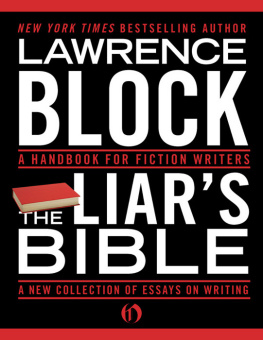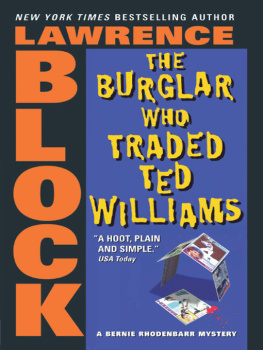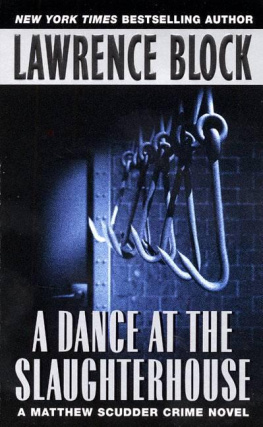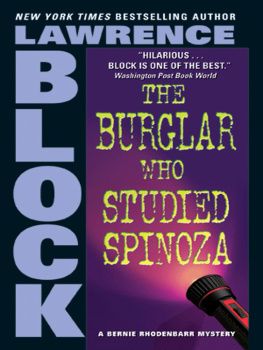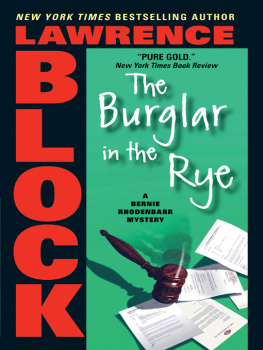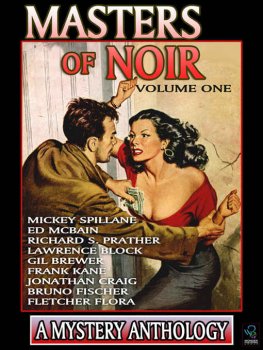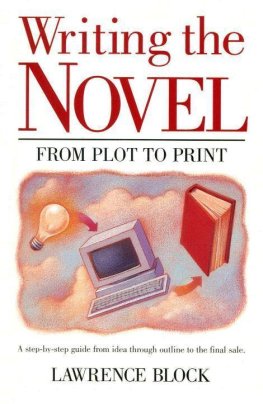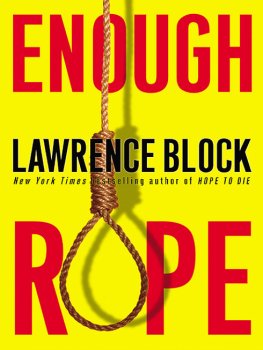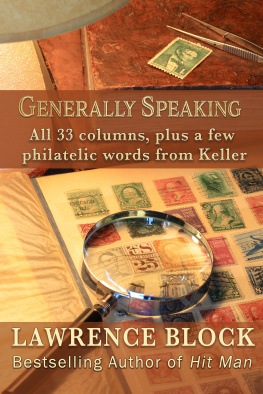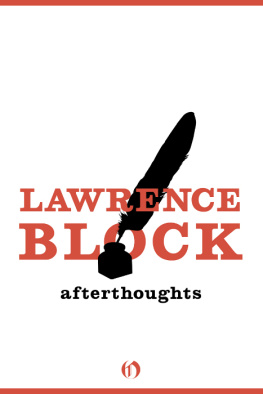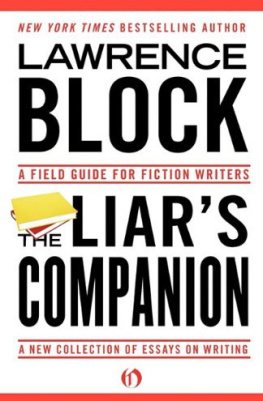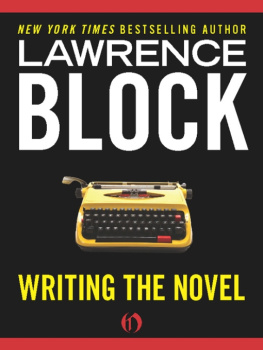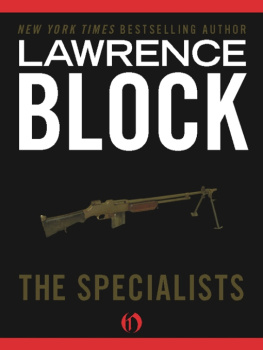
The Liars Bible
A Handbook for Fiction Writers
The Liars Bible
A Handbook for Fiction Writers

Lawrence Block

Introduction
I n the fall of 1975 I spent a month on North Carolinas Outer Banks. Every day I fished off the Rodanthe pier, and every night I ate what I caught. It was a full life.
When I wasnt fishing, I sat in my room and wrote. Along with several short stories, I turned out an essay that attempted to answer the perennial (and perennially annoying) question of the non-writer to the writer: Where do you get your ideas? I discussed the way ideas crop up and how they turn into stories, and I mailed the piece off to Writers Digest and forgot about it.
Six months later I remembered, when I learned that the magazine wanted to buy the article. I was in Los Angeles by then, living at the Magic Hotel, and my daughters would be flying out at the end of June to spend the summer with me. I figured they could keep me company at the hotel for July and we could spend August seeing something of the country on the way back to New York. And one of the places wed stop en route would be Cincinnati, where WDs editor, John Brady, could take me to lunch.
I had an agenda, and I shared it with him over bowls of the chili for which the city is famous. The magazine had several monthly columns, I pointed out, but what it didnt have was a column on the writing of fiction, and that seemed to be the chief interest of the greater portion of its subscribers. Surely they needed a fiction column, and surely I was the very person to write it.
Remarkably enough, Brady agreed with me. Maybe it was the chili. I wound up with an assignment to deliver 1,500 to 2,000 words every other month; theyd cut their cartoon columnist back to six issues a year, to alternate with Fiction.
Id planned on returning to L.A. after I dropped off the kids, but wound up staying in New York. I rented a place on Bleecker Street and went to work. After Id delivered three columns, Brady bumped the cartoon guy altogether and put me on a monthly schedule. I wrote that column, year in and year out, for fourteen years.
T he piece that started it all, the essay I knocked out in Rodanthe when I wasnt hauling spot and croaker out of the Atlantic, wasnt the first Id written about writing. Seventeen years earlier, in early 1958, I was a college student whod dropped out to hang on to a summer job at a New York literary agency, quite the perfect learning experience for a wannabe writer. I spent eight hours a day reading fee scripts, the submissions of other wannabes who paid my boss to read their work. I was the one who read it, and it was my task to write letters over his signature detailing why their stories were unsalable, but assuring them that they were talented, and that they were best advised to write another story, and send it in. Uh, with another check, of course.
The moral and ethical aspects of all of this notwithstanding, it was a wonderful job. You learn more reading inept work than you could ever learn from a master. You see whats wrong. Thats easier than trying to see whats right.
A couple of months into the job, I noticed one obvious error that a surprising number of my earnest hopefuls were committing. They used unwieldy verbs in dialogue, whipping out Rogets Thesaurus to avoid saying said all the time, and then wedding the verb to a cumbersome adverb. I wrote a piece about this, called it Gloomily Asserted Smith, and gave it to Henry Morrison, who occupied the rung directly above mine on the Scott Meredith ladder. He sent it to a magazine called Author and Journalist, and, mirabile dictu, they bought it. I think they paid $25, but it might have been as much as $35; whatever it was, thats what I got... minus 10 percent for Scott, needless to say.
Gloomily Asserted Smith never led anywhere, unless you want to see it as a forerunner of my column. But the column itself led to four books.
The first, Writing the Novel: From Plot to Print, was the suggestion of Brady and his fellows in WDs book division; by that time Id been doing the column for a little over a year. Its been in print ever since.
The second and fourth were Telling Lies for Fun and Profit and Spider, Spin Me a Web. Both were composed of columns Id written for the magazine, collected and arranged in some semblance of order. Telling Lies was published by Arbor House in hardcover and trade paperback, was a Book-of-the-Month Club alternate selection, and has been in print in one edition or another almost continuously since its 1981 publication.
Spider, Spin Me a Web was the same idea, but with columns written after those in Telling Lies. It came out from Writers Digest Books in 1988, and Ive always felt it was the better book, but its never sold nearly as well. The only obvious difference between the two books is the title, and if you think a title doesnt matter, well, you might want to rethink that one.
In 1983, I dreamed up an interactive seminar that would adapt some of the principles and techniques of the Human Potential Movement specifically for writers. I called it Write for Your Life, and for a couple of years my wife Lynne and I flew around the country with it. I realized there ought to be a book version and decided it was a natural for self-publishing, since I could sell it at seminars and promote it in the advertising for the seminar. And if I published it myself I could have copies right away, not a year later. In 1985 I printed 5,000 copies and sold them all; the books available again, but in ebook form only.
In 1990 I came to a parting of the ways with the folks in Cincinnati. There was a change in the editorship, and the new boy felt a need to assert himself, and that was the end of my column. It was a shabby windup to fourteen good years, and it felt odd not to have a column due every month, but on balance I decided it was just as well. By then Id long since exhausted everything I ever knew about writing. Time to hang it up and go on to other things.
So here, two decades later, is my fifth book on the subject. How on earth did that happen?
Well, its not really all that hard to explain. Telling Lies gathered columns from my first four years at WD, Spider from the four or so years after that. That left a lot of columns uncollected, and in the ordinary course of things I would very likely have sorted through them and looked around for a publisher.
But when I rather abruptly stopped writing the column, I quit thinking about the subject. Lynne and I had just returned to New York after a couple of years in Florida and a couple more without a fixed address, and my career as a novelist was blossoming, which meant not only more books to write but more ancillary dutiesbook tours, promotional efforts, and the like.
Time passed. Itll do that.
And then, a couple of years ago, I heard from a fellow I know named Terry Zobeck. Hes a fan and a collector, and his particular collecting interest is centered on the initial magazine appearance of works by those writers he most esteems. Toward this end he had compiled a great number of issues of WD, and by purchasing bulk lots hed wound up with duplicate copies of many of those issues.
Hed checked them against his copies of my books, and established that he had a host of columns and articles of mine that had not appeared in either
Next page
